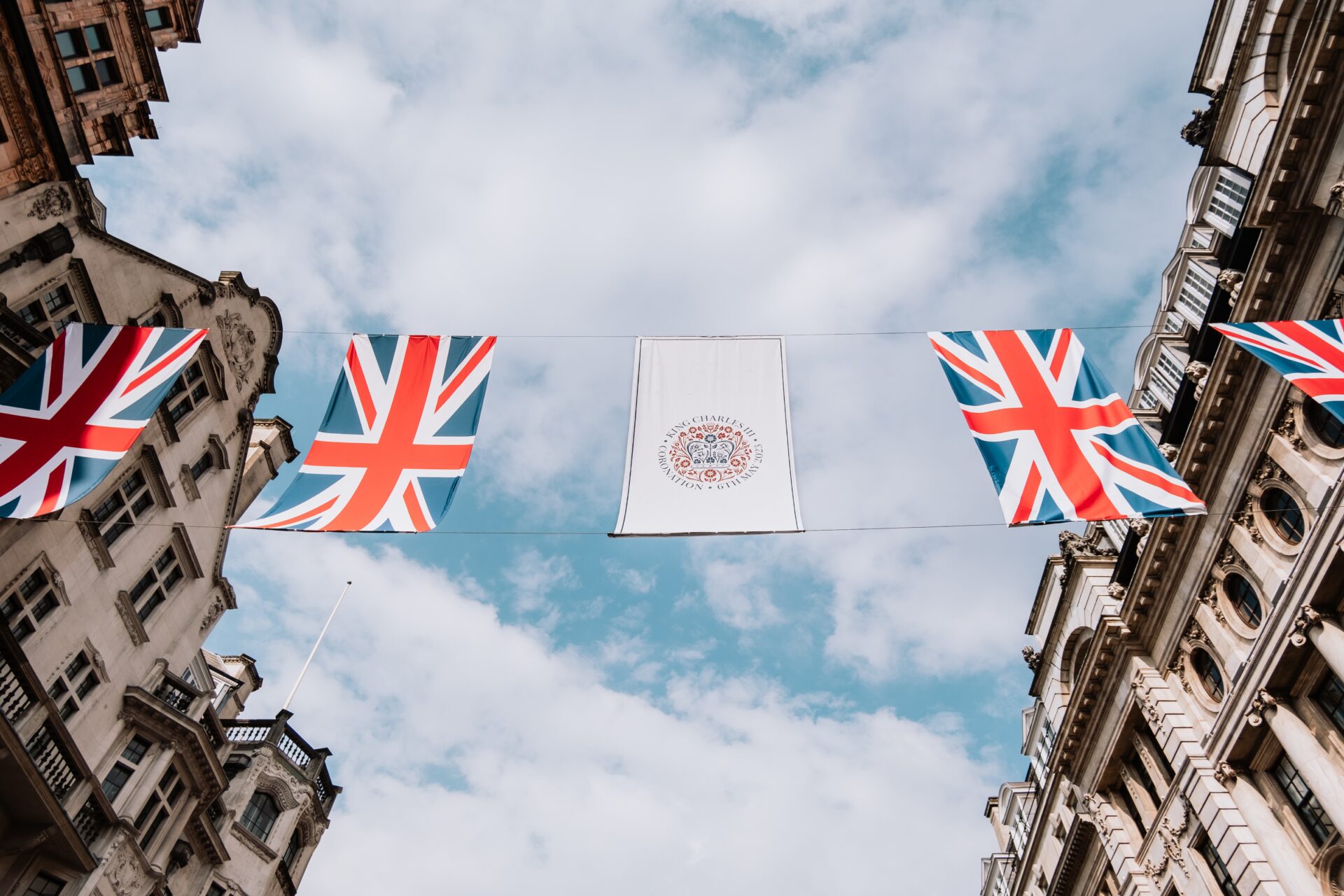
U.K. flags and coronation banner hanging above an English street.
Photo by Samuel Regan-Asante on Unsplash
The meaning of Charles III’s coronation for free churches in the United Kingdom
May 12, 2023
On May 6, 2023, Charles III was crowned as the King of the United Kingdom and 14 Commonwealth realms. As he became King, he also stepped into the role of Supreme Governor of the Church of England. The Church of England is a state church of England (although not Scotland, Wales, or Northern Ireland).
The coronation took place in Westminster Abbey and was led by Archbishop of Canterbury, Justin Welby, the second most important—after the monarch—figure in the Church of England. After taking communion, Charles answered the questions of the royal oath. The Archbishop administered the holy oil, placed the crown on his head, and handed him the royal regalia. The members of the aristocracy knelt in front of the king and put their hands in his, demonstrating their loyalty.
The Coronation—the first one in England in 70 years and the only one with a religious aspect in Europe—was not just a pompous, archaic affair. It was a legal act, the symbol of British identity and the act of reshaping the social hierarchy within the British aristocracy which still holds enormous influence and wealth. The paradox here is that the coronation has mainly a religious character. The monarch reigns by the grace of God; the oils used to anoint him are holy oils from olives grown on the Mount of Olives and blessed at the Church of the Holy Sepulchre in Jerusalem. (The Catholic News Agency highlighted the Catholic character of the ceremony.)
Charles’s coronation is very different from Elizabeth’s 70 years ago. While it was a profoundly Christian ceremony, minority religious leaders were included in it for the first time. Jewish, Muslim, Hindu, Buddhist, and Sikh leaders greeted Charles as he left Westminster Abbey. Minority Christian traditions were also recognized: a Catholic prelate, Cardinal Vincent Nichols of Westminster, participated in the coronation for the first time since the Reformation, offering a blessing after the coronation. A Greek Orthodox choir sang a psalm during the ceremony in honor of the king’s father’s Greek Orthodox baptism.
The inclusion of voices like the Free Churches Group and Baptists Together in King Charles III’s coronation represents the culmination of a gradual move towards inclusion of religious dissenters in British life—to the point that they are now part of the service crowning the new king. But that inclusion comes with other temptations—will groups that have historically been suspicious of power be able to hold to their beliefs in the new pluralist understanding of monarchy?
While Baptists have traditionally espoused a separation between church and state, the Rev. Hayley Young, president of Baptists Together, formerly the Baptist Union of Great Britain, was invited as part of the faith delegation to the coronation. Her own journey seems to mirror that of the complicated nature of the relationship between church and state, as she tweeted: “If you know me well will know I am not a royalist however I represent a whole Movement of people with different views so represent the whole movement as we Build a Bigger Table.” She was also joined by the moderator of the Free Churches Group, who also offered a spoken blessing at the coronation.
This diversity push during coronation is not surprising for two reasons. One, it is clear that attempts were made to represent the growing population of non-Christians, whether those who have left the church or believers of other faiths. The number of British people who identify as Christian has fallen by half since the 1950s, from 86-91% in the mid-20th century to 46% in 2021. Sunday service attendance in 2021 at Anglican churches in England reached a record low at 509,000 people, or less than 1% of the population, while the number of those who identify with “no religion” has been steadily gaining ground.
Two, Charles himself has enthusiastically affirmed diverse religious traditions. In the 1990s, he stated that as King, he would like to be known as “the defender of faith,” in a profoundly symbolic departure from the monarch’s traditional title of “defender of the faith,” meaning (Anglican) Christianity. The difference between the two titles would be significant, given that Charles once said that Islam was “one of the greatest treasuries of accumulated wisdom and spiritual knowledge available to humanity.” (Queen Elizabeth II did express a broad understanding of the Church’s role during her reign, saying that it “has a duty to protect the free practice of all faiths in this country.” She was the first British monarch to enter a mosque in the U.K.)
The inclusion of voices like the Free Churches Group and Baptists Together represents the culmination of a gradual move towards inclusion of religious dissenters in British life—to the point that they are now part of the service crowning the new king. But that inclusion comes with other temptations—will groups that have historically been suspicious of power be able to hold to their beliefs in the new pluralist understanding of monarchy? In many ways, that question is the same question that Baptists in America face. While their theology is suspicious of state power over religious matters, Baptists are generally seen as equally patriotic as their co-religionists (although in the past many Baptists were, for example, ambivalent about the American Revolution as they challenged the Patriot leaders about disestablishing the state church). Undoubtedly, British Baptists will have to continue to maintain that delicate balance, just as we, all people of faith, must.
Rev. Dr. Anna Piela is senior writer, American Baptist Home Mission Societies and co-associate regional minister for White and Multicultural Churches, ABC Metro Chicago. Rev. Dr. Michael Woolf is senior minister, Lake Street Church of Evanston, Illinois.
The views expressed are those of the author and not necessarily those of American Baptist Home Mission Societies.


